What Love is NOT (1979) by Jiddu Krishnamurti
$29.00
Product Include:
File size:
What Love is NOT (1979) by Jiddu Krishnamurti
**More information:
Get What Love is NOT (1979) by Jiddu Krishnamurti at Salaedu.com
Description
Krishnamurti: Why is it that we are incapable of loving? What does it mean to love your fellow man? Is it a commandment, or is it a simple fact that if I do not love you and you do not love me, there can only be hate, violence, and destruction? What prevents us from seeing the very simple fact that this world is ours, that this earth is yours and mine to live upon, undivided by nationalities, by frontiers, to live upon happily, productively, with delight, with affection and compassion? Why is it that we do not see this? I can give you lots of explanations, and you can give me lots more, but mere explanations will never eradicate the fact that we do not love our neighbour. On the contrary, it is because we are forever giving explanations and causes that we do not face the fact. You give one cause, I give another, and we fight over causes and explanations. We are divided as Hindus, Buddhists, Christians, this or that. We say we do not love because of social conditions, or because it is our karma, or because somebody has a great deal of money while we have very little. We offer innumerable explanations, lots of words, and in the net of words we get caught. The fact is that we do not love our neighbour, and we are afraid to face that fact, so we indulge in explanations, in words and the description of the causes; we quote the Gita, the Bible, the Koran, anything to avoid facing the simple fact.
With the facing of that fact there comes a different quality; and it is this quality that saves the world.
What happens when you face the fact and know for yourself that you do not love your neighbour or your son? If you loved your son, you would educate him entirely differently; you would educate him not to fit into this rotten society, but to be self-sufficient, to be intelligent, to be aware of all the influences around him in which he is caught, smothered, and which never allow him to be free. If you loved your son, who is also your neighbour, there would be no wars because you would want to protect him, not your property, your petty little belief, your bank account, your ugly country or your narrow ideology. So you do not love, and that is a fact.
The Bible, the Gita or the Koran may tell you to love your neighbour, but the fact is that you do not love. Now, when you face that fact, what happens? What happens when you are aware that you are not loving, and being aware of that fact, do not offer explanations or give causes as to why you do not love? It is very clear. You are left with the naked fact that you do not love, that you feel no compassion. The contemptuous way you talk to others, the respect you show to your boss, the deep, reverential salute with which you greet your guru, your pursuit of power, your identification with a country, your seeking – all this indicates that you do not love. If you start from there you can do something. If you are blind and really know it, if you do not imagine you can see, what happens? You move slowly, you touch, you feel; a new sensitivity comes into being. Similarly, when I know that I have no love, and do not pretend to love, when I am aware of the fact that I have no compassion and do not pursue the ideal, then with the facing of that fact there comes a different quality; and it is this quality that saves the world, not organized religion or a clever ideology. It is when the heart is empty that the things of the mind fill it; and the things of the mind are the explanations of that emptiness, the words that describe its causes.
So, if you really want to stop wars, if you really want to put an end to this conflict within society, you must face the fact that you do not love. You may go to a temple and offer flowers to a stone image, but that will not give the heart this extraordinary quality of compassion and love, which comes only when the mind is quiet, and not greedy or envious. When you are aware of the fact that you have no love, and do not run away from it by trying to explain it, or find its cause, then that very awareness begins to do something; it brings gentleness, a sense of compassion. Then there is a possibility of creating a world totally different from this chaotic and brutal existence which we now call life.
Krishnamurti in Bombay 1956, Talk 5
AUDIO: Knowing what love is
Our hearts are filled with the things of the mind
Relationship, if we allow it, can be a process of self-revelation; but since we do not allow it, relationship becomes merely a gratifying activity. As long as the mind merely uses relationship for its own security, that relationship is bound to create confusion and antagonism. Is it possible to live in relationship without the idea of demand, want or gratification? Which means, is it possible to love without the interference of the mind? We love with the mind, our hearts are filled with the things of the mind, but the fabrications of the mind cannot be love. You cannot think about love. You can think about the person whom you love, but that thought is not love, and so gradually thought takes the place of love. When the mind becomes supreme, all-important, obviously there can be no affection. We have filled our hearts with the things of the mind, and the things of the mind are essentially ideas – what should be, and what should not be. Can relationship be based on an idea? If it is, is it not a self-enclosing activity and therefore inevitable that there should be contention, strife, and misery? But if the mind does not interfere, it is not erecting a barrier, it is not disciplining suppressing or sublimating itself. This is extremely difficult, because it is not through determination, practice or discipline, that the mind can cease to interfere; the mind will cease to interfere only when there is full comprehension of its own process. Then only is it possible to have right relationship with the one and with the many, free of contention and discord.
Krishnamurti in Ojai 1949, Talk 2
VIDEO: Is love a movement of time and thought?
Ideas about love
Two young men had come from the town nearby. They came in smiling but rather shyly, their manner hesitantly respectful. Once seated, they soon forgot their shyness, and one asked, ‘May I ask a question, sir?’
Of course.
‘What is love? There are so many ideas about what love should be, that it is all rather confusing.’
What sort of ideas?
‘That love shouldn’t be passionate or lustful; that one should love one’s neighbour as oneself; that one should love one’s father and mother; that love should be the impersonal love of God. Everyone gives an opinion according to their fancy.’
Apart from the opinions of others, what do you think? Have you opinions about love too?
‘It is difficult to put into words what one feels,’ replied the second one. ‘I think love must be universal; one must love all, without prejudice. It is prejudice that destroys love; it is class consciousness that creates barriers and divides people. The sacred books say that we must love one another and not be personal or limited in our love, but sometimes we find this very difficult.’
‘To love God is to love all,’ added the first one. ‘There is only divine love; the rest is carnal, personal. This physical love prevents divine love, and without divine love, all other love is barter and exchange. Love is not sensation. Sexual sensation must be checked, disciplined; that is why I’m against birth control. Physical passion is destructive; through chastity lies the way to God.’
Before we go further, don’t you think we ought to find out if all these opinions have any validity? Is not one opinion as good as another? Regardless of who holds it, is not opinion a form of prejudice, a bias created by one’s temperament, one’s experience, and the way one happens to have been brought up?
Understand why we have opinions, ideas and conclusions about love.
‘Do you think it is wrong to hold an opinion?’ asked the second one.
To say that it is wrong or right would merely be another opinion, wouldn’t it? But if one begins to observe and understand how opinions are formed, then perhaps one may be able to perceive the actual significance of opinion, judgment, agreement. Thought is the result of influence, isn’t it? Your thinking and your opinions are dictated by the way you have been brought up. You say, ‘This is right, that is wrong,’ according to the moral pattern of your particular conditioning. We are not for the moment concerned with what is true beyond all influence, or whether there is such truth. We are trying to see the significance of opinions, beliefs, assertions, whether they be collective or personal. Opinion, belief, agreement or disagreement, are responses according to one’s background narrow or wide. Isn’t that so?
‘Yes, but is that wrong?’
Again, if you say it is right or wrong, you are still in the field of opinions. Truth is not a matter of opinion; a fact does not depend on agreement or belief. You and I may agree to call this object a watch, but by any other name it would still be what it is. Your belief or opinion is something that has been given to you by the society in which you live. In revolting against it, as a reaction, you may form a different opinion, another belief; but you are still on the same level, aren’t you?
‘I am sorry but I don’t understand what you are getting at,” replied the second one.
You have certain ideas and opinions about love, haven’t you?
‘Yes.’
How did you get them?
‘I have read what the saints and the great religious teachers have said about love, and having thought it over I have formed my own conclusions.’
Which are shaped by your likes and dislikes, are they not? You like or you don’t like what others have said about love, and you decide which statement is right and which is wrong according to your own predilection.
‘I choose that which I consider to be true.’
On what is your choice based?
‘On my own knowledge and discernment.’
What do you mean by knowledge? I am not trying to trip or corner you but together we are trying to understand why we have opinions, ideas and conclusions about love. If once we understand this, we can go very much more deeply into the matter. So, what do you mean by knowledge?
‘By knowledge I mean what I have learnt from the teachings of the sacred books.’
‘Knowledge embraces also the techniques of modern science, and all the information that has been gathered by man from ancient days up to the present time,’ added the other.
So knowledge is a process of accumulation, is it not? It is the cultivation of memory. The knowledge that we have accumulated as scientists, musicians, scholars, engineers, makes us technical in various departments of life. When we have to build a bridge, we think as engineers, and this knowledge is part of the tradition, part of the background or conditioning that influences all our thinking. Living, which includes the capacity to build a bridge, is a total action, not a separate, partial activity; yet our thinking about life and love is shaped by opinions, conclusions, tradition. If you were brought up in a culture which maintained that love is only physical, and that divine love is all nonsense, you would, in the same way, repeat what you had been taught, wouldn’t you?
‘Not always,’ replied the second one. ‘I admit it is rare, but some of us do rebel and think for ourselves.’
Thought may rebel against the established pattern, but this very revolt is generally the outcome of another pattern; the mind is still caught in the process of knowledge and tradition. It is like rebelling within the walls of a prison for more conveniences, better food and so on. So your mind is conditioned by opinions, tradition, knowledge, and by your ideas about love, which make you act in a certain way. That is clear, isn’t it?
‘Yes sir, that is clear enough,’ answered the first one. ‘But then what is love?’
If you want a definition you can look in any dictionary, but the words which define love are not love. Merely to seek an explanation of what love is, is still to be caught in words and opinions, which are accepted or rejected according to your conditioning.
‘Aren’t you making it impossible to inquire into what love is?’ asked the second one.
Is it possible to inquire through a series of opinions or conclusions? To inquire rightly, thought must be freed from conclusion, from the security of knowledge and tradition. The mind may free itself from one series of conclusions and form another, which is again only a modified continuity of the old. Now, isn’t thought itself a movement from one result to another, from one influence to another? Do you see what I mean?
‘I’m not at all sure that I do,’ said the first one. ‘I don’t understand it at all,’ said the second.
Perhaps you will, as we go along. Let me put it this way: is thinking the instrument of inquiry? Will thinking help one to understand what love is?
‘How am I to find out what love is if I am not allowed to think?’ asked the second one rather sharply.
Please be a little more patient. You have thought about love, haven’t you?
‘Yes. My friend and I have thought a great deal about it.’
If one may ask, what do you mean when you say you have thought about love?
‘I have read about it, discussed it with my friends, and drawn my own conclusions.’
Has it helped you to find out what love is? You have read, exchanged opinions with each other and come to certain conclusions about love, all of which is called thinking. You have positively or negatively described what love is, sometimes adding to, and sometimes taking away from, what you have previously learnt. Isn’t that so?
‘Yes, that’s exactly what we have been doing, and our thinking has helped to clarify our minds.’
Has it? Or have you become more and more entrenched in an opinion? Surely what you call clarification is a process of coming to a definite verbal or intellectual conclusion.
‘That’s right; we are not as confused as we were.’
In other words, one or two ideas stand out clearly in this jumble of teachings and contradictory opinions about love. Isn’t that it?
‘Yes, the more we have gone over this whole question of what love is, the clearer it has become.’
Is it love that has become clear, or what you think about it? Let us go a little further into this, shall we? A certain ingenious mechanism is called a watch because we have all agreed to use this word to indicate that particular thing, but the word watch is obviously not the mechanism itself. Similarly, there is a feeling or a state which we have all agreed to call love, but the word is not the actual feeling. And the word love means so many different things. At one time you use it to describe a sexual feeling, at another time you talk about divine or impersonal love, or you assert what love should or should not be, and so on.
‘If I may interrupt, sir, could it be that all these feelings are just varying forms of the same thing?’ asked the first one. ‘There are moments when love seems to be one thing, but at other moments it appears to be something quite different. It’s all very confusing. One doesn’t know where one is.’
That’s just it. We want to be sure of love, to peg it down so that it won’t elude us. We reach a conclusion, make agreements about it. We call it by various names, with their special meanings. We talk about “my love”, just as we talk about “my property”, “my family” or “my virtue”, and we hope to lock it safely away so that we can turn to other things and make sure of them too. But somehow it’s always slipping away when we least expect it.
‘I don’t quite follow all this,’ said the second one, rather puzzled.
As we have seen, the feeling itself is different from what the books say about it; the feeling is not the description, it is not the word. That much is clear, isn’t it? Now, can you separate the feeling from the word, and from your preconceptions of what it should and should not be?
‘What do you mean “separate”?’ asked the first one.
There is the feeling, and the word or words which describe that feeling, either approvingly or disapprovingly. Can you separate the feeling from the verbal description of it? It is comparatively easy to separate an objective thing, like this watch, from the word which describes it, but to dissociate the feeling itself from the word love, with all its implications, is far more arduous and requires a great deal of attention.
‘What good will that do?’ asked the second one.
We always want to get a result in return for doing something. This desire for a result, which is another form of conclusion seeking, prevents understanding. When you ask, ‘What good will it do me if I dissociate the feeling from the word love?’ you are thinking of a result, therefore you are not really inquiring to find out what that feeling is.
‘I do want to find out, but I also want to know what will be the outcome of dissociating the feeling from the word. Isn’t this perfectly natural?’
When you love, everything will come right. Love has its own action.
Perhaps, but if you want to understand you will have to give your attention, and there is no attention when one part of your mind is concerned with results and the other with understanding. In this way you get neither and so you become more and more confused, bitter and miserable. If we don’t dissociate the word, which is memory and all its reactions, from the feeling, then that word destroys the feeling, and then the word, or memory, is the ash without the fire. Isn’t this what has happened to you both? You have so entangled yourselves in a net of words and speculations that the feeling itself, which is the only thing that has deep and vital significance, is lost.
‘I am beginning to see what you mean,’ said the first one slowly. ‘We are not simple; we don’t discover anything for ourselves but just repeat what we have been told. Even when we revolt we form new conclusions, which again have to be broken down. We really don’t know what love is, but merely have opinions about it. Is that it?’
Don’t you think so? Surely, to know love, truth, God, there must be no opinions, no beliefs, no speculations with regard to it. If you have an opinion about a fact, the opinion becomes important, not the fact. If you want to know the truth or the falseness of the fact, then you must not live in the word, in the intellect. You may have a lot of knowledge and information about the fact, but the actual fact is entirely different. Put away the book, the description, the tradition, the authority, and take the journey of self-discovery. Love, and don’t be caught in opinions and ideas about what love is or should be. When you love, everything will come right. Love has its own action. Love, and you will know the blessings of it. Keep away from the authority who tells you what love is and what it is not. No authority knows; and he who knows cannot tell. Love, and there is understanding.
From the book Commentaries on Living III, by J. Krishnamurti
VIDEO: Love and death
Love is a flame without smoke
Question: I cannot conceive of a love which is neither felt nor thought of. You are probably using the word love to indicate something else. Is it not so?
Krishnamurti: When we say love, what do we mean by it? Actually, not theoretically, what do we mean? It is a process of sensation and thought, is it not? That is what we mean by love: a process of thought, a process of sensation.
Is thought, love? When I think of you, is that love? When I say that love must be impersonal or universal, is that love? Surely, thought is the result of a feeling, of sensation, and as long as love is held within the field of sensation and thought, obviously there must be conflict in that process. And must we not find out if there is something beyond the field of thought?
We don’t know how to love, we only know how to think about love.
We know what love is in the ordinary sense: a process of thought and sensation. If we do not think of a person, we think we do not love them; if we do not feel, we think there is no love. But is that all? Or is love something beyond? And to find out, must not thought as sensation come to an end? After all, when we love somebody, we think about them, we have a picture of them. That is, what we call love is a thinking process, a sensation, which is memory: the memory of what we did or did not do with him or her. So memory, which is the result of sensation, which becomes verbalized thought, is what we call love. And even when we say that love is impersonal, cosmic, or what you will, it is still a process of thought.
Now, is love a process of thought? Can we think about love? We can think about the person, or think of memories with regard to that person, but is that love? Surely, love is a flame without smoke. The smoke is that with which we are familiar – the smoke of jealousy, of anger, of dependence, of calling it personal or impersonal, the smoke of attachment. We have not the flame, but we are fully acquainted with the smoke; and it is possible to have that flame only when the smoke is not. Therefore our concern is not with love, whether it is something beyond the mind or beyond sensation, but to be free of the smoke: the smoke of jealousy, of envy, the smoke of separation, of sorrow and pain. Only when the smoke is not shall we know that which is the flame. And the flame is neither personal nor impersonal, neither universal nor particular – it is just a flame; and there is the reality of that flame only when the mind, the whole process of thought, has been understood. So, there can be love only when the smoke of conflict of competition, struggle, envy, comes to an end, because that process breeds opposition, in which there is fear. As long as there is fear, there is no communion, for one cannot commune through the screen of smoke.
So, it is clear that love is possible only without the smoke; and as we are acquainted with the smoke, let us go into it completely, understand it fully, so as to be free of it. Then only shall we know that flame which is neither personal nor impersonal and which has no name. That which is new cannot be given a name. Our question is not what love is, but what are the things that are preventing the fullness of that flame? We don’t know how to love, we only know how to think about love. In the very process of thinking we create the smoke of the “me” and the “mine”, and in that we are caught. Only when we are capable of freeing ourselves from the process of thinking about love and all the complications that arise out of it, is there a possibility of having that flame.
1 review for What Love is NOT (1979) by Jiddu Krishnamurti
Add a review Cancel reply
Related products
Everything Else
Plein Air, Painting the American Landscape – Alaska Episodes
Everything Else
Everything Else

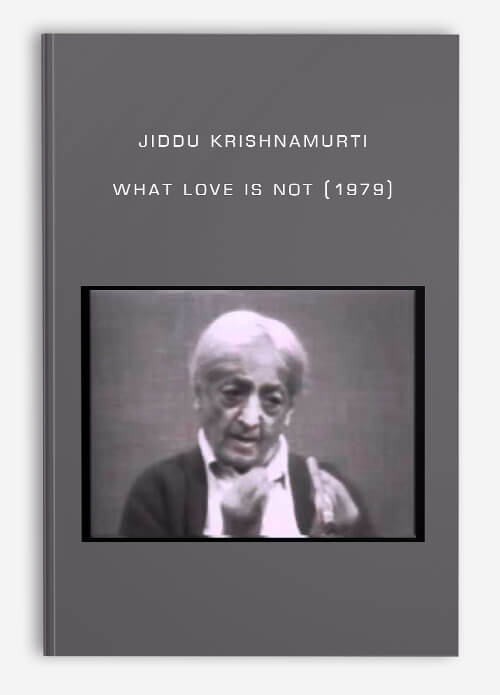
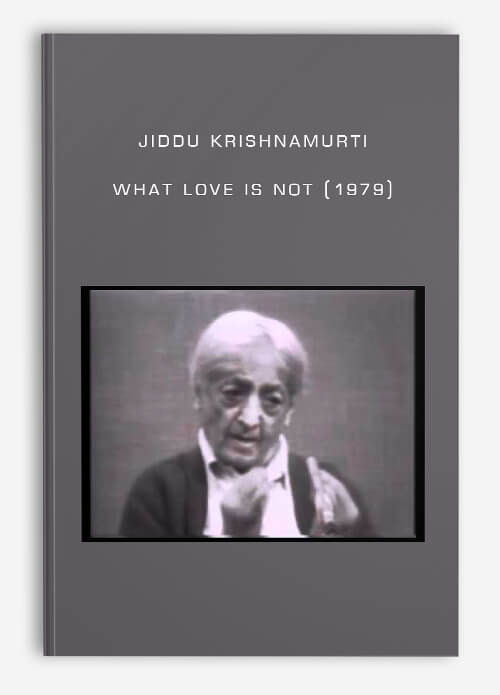


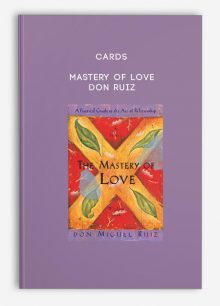

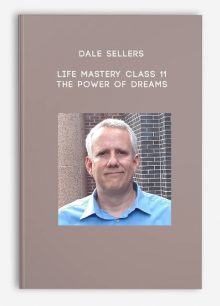


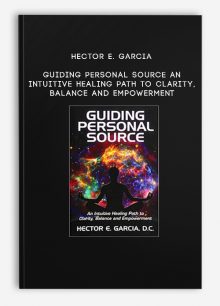
king –
We encourage you to check Content Proof carefully before paying.“Excepted” these contents: “Online coaching, Software, Facebook group, Skype and Email support from Author.”If you have enough money and feel good. We encourage you to buy this product from the original Author to get full other “Excepted” contents from them.Thank you!